Director's
Commentary
blank
blank
blank
Welcome
Hello, Iím Hipolito, and I made this website to archive my posts in the Ultima IV Challenge thread on the Gone Gold Forum. I hope you enjoy it!
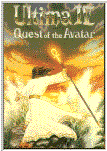 On the forum, someone occasionally started a ďchallengeĒ thread when he or she began to play a particular game, inviting others to play that game as well and post their progress. Originally, these threads were competitions for finishing first, but later they became about sharing experiences. One thread was for Ultima IV: Quest of the Avatar, a 1985 roleplayiung game widely considered one of the best computer games of all time. Iíd never played it, so I joined the challenge to motivate myself to give this classic a chance.
On the forum, someone occasionally started a ďchallengeĒ thread when he or she began to play a particular game, inviting others to play that game as well and post their progress. Originally, these threads were competitions for finishing first, but later they became about sharing experiences. One thread was for Ultima IV: Quest of the Avatar, a 1985 roleplayiung game widely considered one of the best computer games of all time. Iíd never played it, so I joined the challenge to motivate myself to give this classic a chance.
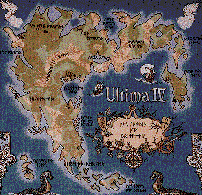 Perhaps because I was getting frustrated with the game (read my opinion below for the reasons why), my imagination took over and began developing an alternate story for the game. I wrote this story in my posts to the thread, giving personalities to the game characters as well as the real reason why my alter ego, Sausalito, was given the quest to become the Avatar. I altered the screenshots I posted to fit the story, which grew in length and absurdity and took over the thread. I had no intention of going so far, but writing my ďjournalĒ became an obsession; one hour of playing the game could mean four to five hours of writing and screenshot alteration. I played the game to the end, to see how both it and my interpretation would conclude. People enjoyed reading the journal, and suggested that I put up a website to preserve it. So here you are!
Perhaps because I was getting frustrated with the game (read my opinion below for the reasons why), my imagination took over and began developing an alternate story for the game. I wrote this story in my posts to the thread, giving personalities to the game characters as well as the real reason why my alter ego, Sausalito, was given the quest to become the Avatar. I altered the screenshots I posted to fit the story, which grew in length and absurdity and took over the thread. I had no intention of going so far, but writing my ďjournalĒ became an obsession; one hour of playing the game could mean four to five hours of writing and screenshot alteration. I played the game to the end, to see how both it and my interpretation would conclude. People enjoyed reading the journal, and suggested that I put up a website to preserve it. So here you are!
If youíve read the thread already, explore the site and see what Iíve added. If you havenít, you may begin by pressing ďPlayĒ on the DVD Menu or accessing Chapter 1 in the low-bandwidth Site Index; however, you may want to read the original thread instead. Itís more interesting in the context of the challenge discussion.
The Making of ďThe Little ShepherdĒ
 I played the PC version of Ultima IV: Quest of the Avatar using XU4 version 0.9 and Upgrade version 1.3. I used Photoshop 5.5 for the artwork and ImageReady 2.0 for animation. I built this website on Notepad.
I played the PC version of Ultima IV: Quest of the Avatar using XU4 version 0.9 and Upgrade version 1.3. I used Photoshop 5.5 for the artwork and ImageReady 2.0 for animation. I built this website on Notepad.
Opinion on the Game
Nearly twenty years ago, Richard Garriott designed a game that veered a bit off his own beaten path. He had already gained notoriety for his previous games, Akalabeth (ďUltima 0Ē) and the first three Ultima titles. Those games are credited for giving rise to the genre of computer roleplaying games (CRPGs), but arenít really about anything except being the good guy and vanquishing the bad guy. Ultima IV is the first computer game to remove the bad guy so that the good guy is forced to ask himself just what makes him good.
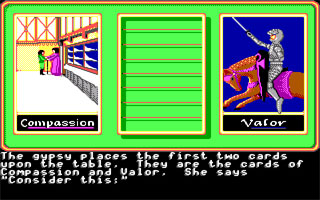 The first thing you do in the game is find out who you are. You are seated at a table across from a gypsy, using your own ethical compass to solve the hypothetical dilemmas she poses. Then she whisks you away to the vast fantasy realm of Britannia, where you begin adventuring as a character whose traits are determined by how you answered the gypsyís questions. (For instance, if you chose the valorous approach to the hypotheticals, you may start as a mighty fighter. If your answers emphasized humility, youíll have to roam the dangerous world as a meek shepherd.) Soon, probably after getting killed by the first wandering creature or poisonous plant you brush up against, youíll meet Lord British, Garriottís alter ego in the game. He will tell you that since the great evils of the land have been vanquished (see the first three Ultimas), the people need someone to guide them towards virtue. You could be that inspiring light by discovering and upholding the eight virtues and becoming . . . the Avatar!
The first thing you do in the game is find out who you are. You are seated at a table across from a gypsy, using your own ethical compass to solve the hypothetical dilemmas she poses. Then she whisks you away to the vast fantasy realm of Britannia, where you begin adventuring as a character whose traits are determined by how you answered the gypsyís questions. (For instance, if you chose the valorous approach to the hypotheticals, you may start as a mighty fighter. If your answers emphasized humility, youíll have to roam the dangerous world as a meek shepherd.) Soon, probably after getting killed by the first wandering creature or poisonous plant you brush up against, youíll meet Lord British, Garriottís alter ego in the game. He will tell you that since the great evils of the land have been vanquished (see the first three Ultimas), the people need someone to guide them towards virtue. You could be that inspiring light by discovering and upholding the eight virtues and becoming . . . the Avatar!
That sounds like a unique quest, but the experience of solving it isnít much different from any prior or subsequent CRPG. You have to explore the land, fight off relentless creatures, talk to townspeople for clues, and search for important artifacts. These activities are the meat of the gameplay, and unfortunately donít stand out as a gaming experience.
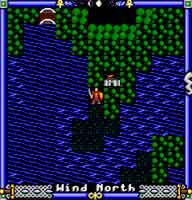 Letís look at exploration first. Although each town has a distinct design that lends it personality, getting there is less than half the fun. Any square of the landscapeís terrain that isnít a flat patch of grass is only going to slow you down. This wouldnít be a problem if the world werenít such a dauntingly vast place. Before I figured out the moongate system, I spent entire gaming sessions struggling to get from Point A to Point B. There are forms of transportation that decrease travel time, but they require special attention and come with their own annoying limitations. For instance, horses are handy for getting across land quickly, but I was surprised to find that I couldnít take them aboard ships. So when I made an ocean voyage, I had to carefully note where I left them, or Iíd spend hours looking for them or earning money to buy replacements.
Letís look at exploration first. Although each town has a distinct design that lends it personality, getting there is less than half the fun. Any square of the landscapeís terrain that isnít a flat patch of grass is only going to slow you down. This wouldnít be a problem if the world werenít such a dauntingly vast place. Before I figured out the moongate system, I spent entire gaming sessions struggling to get from Point A to Point B. There are forms of transportation that decrease travel time, but they require special attention and come with their own annoying limitations. For instance, horses are handy for getting across land quickly, but I was surprised to find that I couldnít take them aboard ships. So when I made an ocean voyage, I had to carefully note where I left them, or Iíd spend hours looking for them or earning money to buy replacements.
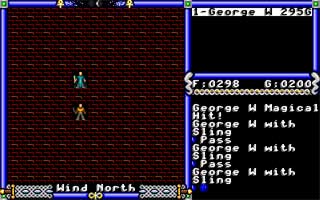 Combat hampers progress even further. Even in the new age of peace, the realm crawls with hostile beings that hurl themselves at you in every clearing, grove, and stretch of ocean. They come in many species with various offensive abilities, and youíll eventually have an arsenal of weapons and spells to fight them. But combat isnít challenging enough to require much tactical thinking, or rewarding enough to get excited about. Most fights can be settled with plain old hand-to-hand combat, and donít yield any loot beyond gold and experience points. Itís nice that combat is easy enough to allow the adventurer to focus on the adventure, but the frequency of it still poses a distraction.
Combat hampers progress even further. Even in the new age of peace, the realm crawls with hostile beings that hurl themselves at you in every clearing, grove, and stretch of ocean. They come in many species with various offensive abilities, and youíll eventually have an arsenal of weapons and spells to fight them. But combat isnít challenging enough to require much tactical thinking, or rewarding enough to get excited about. Most fights can be settled with plain old hand-to-hand combat, and donít yield any loot beyond gold and experience points. Itís nice that combat is easy enough to allow the adventurer to focus on the adventure, but the frequency of it still poses a distraction.
Once you make it to a new town, youíll want to pump all the residents for information. There are about 200 people in the game to talk to, and many of them have clues on the virtues you have to uphold, the artifacts you have to fetch, and the dungeons that contain them. Unfortunately, just about everyone in Britannia has only one terse thing to say to you, be it a clue or witticism, and the conversation system involves figuring out the bingo keyword that will provoke that little nugget of information.
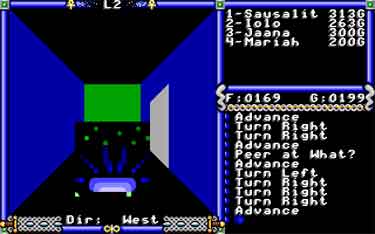 Then itís off to the dungeons to find the artifacts you need to complete your quest. While the dungeons arenít large or complex, there are enough traps, secret doors and monster lairs to make each dungeon run a trial you have to prepare for ahead of time. Youíll need to map your progress to avoid getting lost (or, better yet, use someone elseís map to find those quest objects quickly). Unfortunately, the dungeons arenít as distinct from one other as the towns, and look like the halls of a cheap motel. It's a good thing there are magic spells to transport you upstairs and downstairs instantly so that you wonít have to spend as much time in them.
Then itís off to the dungeons to find the artifacts you need to complete your quest. While the dungeons arenít large or complex, there are enough traps, secret doors and monster lairs to make each dungeon run a trial you have to prepare for ahead of time. Youíll need to map your progress to avoid getting lost (or, better yet, use someone elseís map to find those quest objects quickly). Unfortunately, the dungeons arenít as distinct from one other as the towns, and look like the halls of a cheap motel. It's a good thing there are magic spells to transport you upstairs and downstairs instantly so that you wonít have to spend as much time in them.
The game would be more interesting, and feel more like a study in ethics, if it posed dilemmas for your character to solve during the quest. Wouldn't it be great if those hypothetical situations the gypsy asked you to address actually happened during the adventure? The virtues do affect the game a bit: youíll suffer setbacks for things like dishonesty, stealing, and killing non-evil creatures. But they donít do enough to distinguish the gameplay from that of other CRPGs; itís still all about running from one encounter to the next and collecting arcane objects.
That doesnít mean the gameís not fun. Once you develop an ďaw, shucksĒ attitude and take whatever comes, you can get caught up in hunting for artifacts, amassing enough gold to purchase better weapons and spell reagents, and adding companions to your party to help you slaughter enemies. The punishment for mistakes is usually not severe, and even death is a minor setback. Itís clear that Garriott wants you to complete the game successfully, so he encourages you through forgiving gameplay and his benevolent alter ego (though it would be a good idea to enable the cheat codes before taking on the final challenge).
In the end, the game is a dialogue between Garriott and the gamer, performed through their alter egos, in which he proposes a philosophy for living. While not deep, itís a clever amd compelling way to convey a personal message, and I donít think any other game has attempted the same thing.
Iím glad that I finally experienced what many CRPG enthusiasts remember fondly playing 20 years ago, but Iím not as affected by it as they were. I can enjoy an old game and look past all considerations of graphics, sound, and interface if the gameplay at the core is fun. I honestly donít think I would have enjoyed Ultima IV more had I played it when it came out. I didnít even enjoy it as much as the original Ultima, which I tried only a few years ago and loved for its goofy surprises and manic, mirthful pace.
Ultima IV is a good time, but I had a lot more fun Photoshopping it.
Rating: Two-and-a-half cosmolithic hamburgers (on a scale of zero to four).

blank
blank
blank
 On the forum, someone occasionally started a ďchallengeĒ thread when he or she began to play a particular game, inviting others to play that game as well and post their progress. Originally, these threads were competitions for finishing first, but later they became about sharing experiences. One thread was for Ultima IV: Quest of the Avatar, a 1985 roleplayiung game widely considered one of the best computer games of all time. Iíd never played it, so I joined the challenge to motivate myself to give this classic a chance.
On the forum, someone occasionally started a ďchallengeĒ thread when he or she began to play a particular game, inviting others to play that game as well and post their progress. Originally, these threads were competitions for finishing first, but later they became about sharing experiences. One thread was for Ultima IV: Quest of the Avatar, a 1985 roleplayiung game widely considered one of the best computer games of all time. Iíd never played it, so I joined the challenge to motivate myself to give this classic a chance. Perhaps because I was getting frustrated with the game (read my opinion below for the reasons why), my imagination took over and began developing an alternate story for the game. I wrote this story in my posts to the thread, giving personalities to the game characters as well as the real reason why my alter ego, Sausalito, was given the quest to become the Avatar. I altered the screenshots I posted to fit the story, which grew in length and absurdity and took over the thread. I had no intention of going so far, but writing my ďjournalĒ became an obsession; one hour of playing the game could mean four to five hours of writing and screenshot alteration. I played the game to the end, to see how both it and my interpretation would conclude. People enjoyed reading the journal, and suggested that I put up a website to preserve it. So here you are!
Perhaps because I was getting frustrated with the game (read my opinion below for the reasons why), my imagination took over and began developing an alternate story for the game. I wrote this story in my posts to the thread, giving personalities to the game characters as well as the real reason why my alter ego, Sausalito, was given the quest to become the Avatar. I altered the screenshots I posted to fit the story, which grew in length and absurdity and took over the thread. I had no intention of going so far, but writing my ďjournalĒ became an obsession; one hour of playing the game could mean four to five hours of writing and screenshot alteration. I played the game to the end, to see how both it and my interpretation would conclude. People enjoyed reading the journal, and suggested that I put up a website to preserve it. So here you are! The first thing you do in the game is find out who you are. You are seated at a table across from a gypsy, using your own ethical compass to solve the hypothetical dilemmas she poses. Then she whisks you away to the vast fantasy realm of Britannia, where you begin adventuring as a character whose traits are determined by how you answered the gypsyís questions. (For instance, if you chose the valorous approach to the hypotheticals, you may start as a mighty fighter. If your answers emphasized humility, youíll have to roam the dangerous world as a meek shepherd.) Soon, probably after getting killed by the first wandering creature or poisonous plant you brush up against, youíll meet Lord British, Garriottís alter ego in the game. He will tell you that since the great evils of the land have been vanquished (see the first three Ultimas), the people need someone to guide them towards virtue. You could be that inspiring light by discovering and upholding the eight virtues and becoming . . . the Avatar!
The first thing you do in the game is find out who you are. You are seated at a table across from a gypsy, using your own ethical compass to solve the hypothetical dilemmas she poses. Then she whisks you away to the vast fantasy realm of Britannia, where you begin adventuring as a character whose traits are determined by how you answered the gypsyís questions. (For instance, if you chose the valorous approach to the hypotheticals, you may start as a mighty fighter. If your answers emphasized humility, youíll have to roam the dangerous world as a meek shepherd.) Soon, probably after getting killed by the first wandering creature or poisonous plant you brush up against, youíll meet Lord British, Garriottís alter ego in the game. He will tell you that since the great evils of the land have been vanquished (see the first three Ultimas), the people need someone to guide them towards virtue. You could be that inspiring light by discovering and upholding the eight virtues and becoming . . . the Avatar!  Letís look at exploration first. Although each town has a distinct design that lends it personality, getting there is less than half the fun. Any square of the landscapeís terrain that isnít a flat patch of grass is only going to slow you down. This wouldnít be a problem if the world werenít such a dauntingly vast place. Before I figured out the moongate system, I spent entire gaming sessions struggling to get from Point A to Point B. There are forms of transportation that decrease travel time, but they require special attention and come with their own annoying limitations. For instance, horses are handy for getting across land quickly, but I was surprised to find that I couldnít take them aboard ships. So when I made an ocean voyage, I had to carefully note where I left them, or Iíd spend hours looking for them or earning money to buy replacements.
Letís look at exploration first. Although each town has a distinct design that lends it personality, getting there is less than half the fun. Any square of the landscapeís terrain that isnít a flat patch of grass is only going to slow you down. This wouldnít be a problem if the world werenít such a dauntingly vast place. Before I figured out the moongate system, I spent entire gaming sessions struggling to get from Point A to Point B. There are forms of transportation that decrease travel time, but they require special attention and come with their own annoying limitations. For instance, horses are handy for getting across land quickly, but I was surprised to find that I couldnít take them aboard ships. So when I made an ocean voyage, I had to carefully note where I left them, or Iíd spend hours looking for them or earning money to buy replacements. Combat hampers progress even further. Even in the new age of peace, the realm crawls with hostile beings that hurl themselves at you in every clearing, grove, and stretch of ocean. They come in many species with various offensive abilities, and youíll eventually have an arsenal of weapons and spells to fight them. But combat isnít challenging enough to require much tactical thinking, or rewarding enough to get excited about. Most fights can be settled with plain old hand-to-hand combat, and donít yield any loot beyond gold and experience points. Itís nice that combat is easy enough to allow the adventurer to focus on the adventure, but the frequency of it still poses a distraction.
Combat hampers progress even further. Even in the new age of peace, the realm crawls with hostile beings that hurl themselves at you in every clearing, grove, and stretch of ocean. They come in many species with various offensive abilities, and youíll eventually have an arsenal of weapons and spells to fight them. But combat isnít challenging enough to require much tactical thinking, or rewarding enough to get excited about. Most fights can be settled with plain old hand-to-hand combat, and donít yield any loot beyond gold and experience points. Itís nice that combat is easy enough to allow the adventurer to focus on the adventure, but the frequency of it still poses a distraction. Then itís off to the dungeons to find the artifacts you need to complete your quest. While the dungeons arenít large or complex, there are enough traps, secret doors and monster lairs to make each dungeon run a trial you have to prepare for ahead of time. Youíll need to map your progress to avoid getting lost (or, better yet, use someone elseís map to find those quest objects quickly). Unfortunately, the dungeons arenít as distinct from one other as the towns, and look like the halls of a cheap motel. It's a good thing there are magic spells to transport you upstairs and downstairs instantly so that you wonít have to spend as much time in them.
Then itís off to the dungeons to find the artifacts you need to complete your quest. While the dungeons arenít large or complex, there are enough traps, secret doors and monster lairs to make each dungeon run a trial you have to prepare for ahead of time. Youíll need to map your progress to avoid getting lost (or, better yet, use someone elseís map to find those quest objects quickly). Unfortunately, the dungeons arenít as distinct from one other as the towns, and look like the halls of a cheap motel. It's a good thing there are magic spells to transport you upstairs and downstairs instantly so that you wonít have to spend as much time in them.